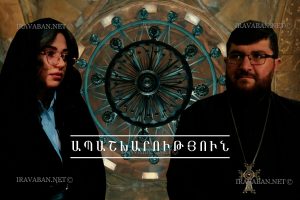Within the framework of “The Church and the Law” series of interviews, Iravaban.net talked with Rev. Fr. Tigran Badiryan, Responsible for the Church-Congregational Office of the Chancellery of the Mother See of Holy Etchmiadzin․
– What does the church understand by saying sin?
– When we talk about sin, we must be able to distinguish between the mechanisms of assessing sin that Christianity has and the church has. Therefore, when we talk about sin, we must first understand who has the authority to judge. It is interesting that the right to judge, according to Christianity, belongs to the person who commits a sin, because sin is not an act in its essence, but a break in the sacred space of God and man, contact, this break can be felt only by a person who lives in the crisis of that relationship.
– Does the church distinguish the degree of sin?
– When we talk about sin, as a theological term, the logic is in the union of man and God, and when we rank sin, it means that we see a subjective judgment in it, because the ranker cannot be the person committing the sin, however the church has its own tradition, that is, the life lived by the church, the influence of the Holy Spirit in the church and the experience of this life allow the church to determine to what extent any action, any thought, any reality breaks the connection between God and man. In this context, yes, it is possible to measure the sin and to set a mark.
– How can a person know that he was judged for any of his sins? Who judges us?
– When talking about sin, it is important to understand the judgment itself, and who does it. In the Gospel, we meet the Lord’s words, which he says: “Who who made me a judge over you?” Therefore, God’s judgment is not a judgment of punishment, but a judgment of justification. In our prayers, the ” terrible doomsday” is not terrible because it no longer gives us a chance to be justified, but it is terrible because it gives us a chance to inherit the master’s mercy for the last time, because in this judgment God will not act as a prosecutor, but as our attorney, that is, to justify us. The Lord speaks very unequivocally about this when he says: Moses will judge you, that is, God is the justifier, and if it were not so, God’s sacrifice, death by crucifixion, would not make sense, if God had to judge us.
– How do the followers of the Armenian Apostolic Church repent?
– The modern world gives the impression that repentance and, for example, serving a sentence in prison is the same thing. Therefore, if we refer to sin as a break in the relationship between God and man, then repentance is not a punishment but a transformation of a person. Sin is the shadow on the path of light that prevents us from communicating with God. Therefore, in order to restore our contact with God, we must turn from darkness to light, we must not only suffer direct punishment, but we must be transformed. We must turn from darkness to light. One of the important differences between sin and crime is that, if the crime is apparent, that is, it can be seen, assessed, and otherwise it cannot be considered a crime, the sin has a more inner nature, that is, no one can say the person committing the sin more than the man that committed the sin.
– How to understand that a person has repented?
-Actually, it is much easier to recognize a repented person than to understand whether the social order has been restored or not or the damage caused has been restored or not, because a repented person is a newly born person, a changed person. The mystery of baptism is about this, that in order to be born in Christ, the former person must die. In other words, a person not only renounces any of his acts, but also renounces the environment in which he committed that act. If crime is closely related to public perceptions, political and cultural situation of the time, sinning and relationship with God are completely independent of such perceptions.
– Is there a difference that a person commits a sin unconsciously, without understanding that it is a sin?
– In his letter to the Romans, the Apostle Paul explains in great detail the difference between law and grace. Grace is the living contact between man and God, in the presence of God every moment in man’s life. These relations are higher than a person’s cultural, national and social affiliation. The man who stole from a stranger is less painful than the man who stole from his own father.
– Is there any difference when the same sin is committed by a baptized or not baptized person?
– As long as a person is not a co-heir of Christ, until he has become a child of his own will and entered the kingdom that the Lord gave us, in fact, these sins cannot be considered sins from a Christian point of view, because a person does not have the obligation to receive any grace. Sin exists only in people who have contact. If a person does not have a father, i.e. he is not a co-heir of Christ, then from a Christian point of view he cannot commit a sin, that is, he cannot cause a break in his contact with God. This does not mean that a person cannot commit sins against morality. Often, morality and faith are perceived as synonyms, but these are not synonyms at all, because moral norms change over time, but the relationship between man and God knows no time. The simplest example: once women with short hair were considered immoral, but now no one would even think that people with short hair are immoral.
– When something bad happens to people, they say: “God punished.” How will you explain this?
– God never punishes a person, when we talk about the logic of punishment, it seems as if God is a policeman and is waiting for us to commit any violation and write an act on us so that we also suffer that punishment. God is our father, but God, being our father, respects our freedom. When we talk about big disasters, wars, children’s deaths, we often ask: why does God allow wars to happen, children to die? The events that happen to us are the consequences of our actions and the consequences of those actions are very natural, it is just that not every person is able to clearly see the cause and effect relationship between their actions and the situation that a person has. Whatever happens in a person’s life, even the biggest misfortune, the death of a child, happens for the salvation of a person.
– Often God is also called Judge.
– Yes, God is a judge, but God’s judgment is a judgment of mercy, not of punishment.
– What is justice?
– God’s love.
– What is morality?
– The presence of God in everyday life.
– What is faith?
– The presence of God.
– To what extent are justice, morality and faith interrelated?
– To the extent that God is present in the life of an individual, society, people and state.
Details in the video.
Hasmik Sargsyan

















